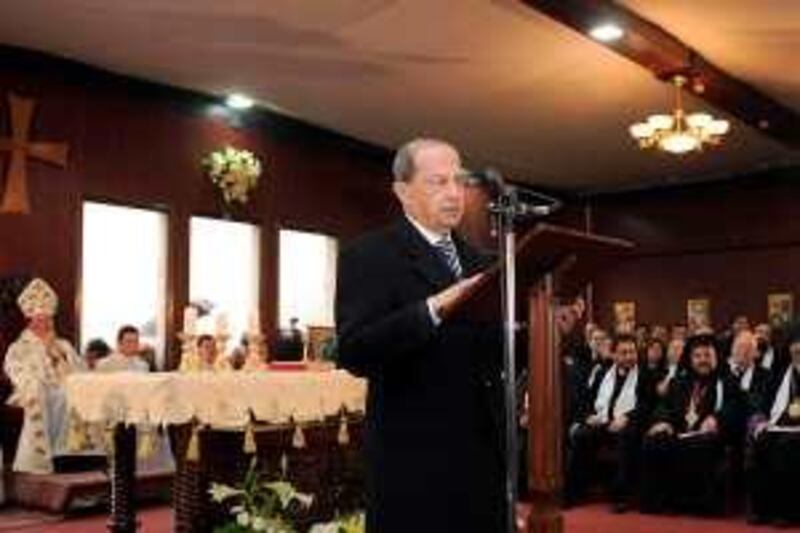BEIRUT // What should have been an ordinary celebration of the patron saint of most Lebanese Christians has turned into controversy after several opposition leaders opted to spend the occasion in Syria with its president Bashar al Assad rather than with their own president in Beirut.
Mar Maroun, after whom the largest sect of Lebanese Christians is named, was Syrian, leaving ample justification for the Syrian city of Aleppo as the choice of venue to mark the 1,600th anniversary of his death. But the fact that Christian leaders are divided over something as simple as a Christian mass highlights the rift within the community that stubbornly remains while other local rivalries have slowly eased during Lebanon's recent period of stability.
The decision of the former general Michel Aoun, the most prominent Christian ally of the primarily Shiite Muslim opposition, to attend the mass in Syria shocked many in light of his animosity towards the Syrian regime before his political alliance with Hizbollah in early 2006. During his brief tenure as prime minister in the waning days of the Lebanese Civil War in 1990, Mr Aoun started a quixotic war pitting the shattered Lebanese army against the much more powerful Syrian presence in Lebanon at the time.
His effort ended when he was chased out of the presidential palace in his nightclothes by Syrian air strikes, followed by nearly 15 years in exile in France. While that is commonly remembered as one of the final acts of the nearly two-decade-long civil war, Mr Aoun's earlier decision to turn the army against rival Christian militias in fighting that shattered the remnants of East Beirut created an enduring divide among Lebanon's Christians.
Mr Aoun returned to Lebanon in 2005 in the wake of Syria's withdrawal from the country. "Aoun is a murderer of his fellow Christians," said Abu Fares, an East Beirut veteran of the fight between the army and the Lebanese Forces militia, which today exists as a political party. "His betrayal was the worst so it came as no surprise that when he returned from France, where he ate steak each night while our leaders rotted in jails in Lebanon, he jumped into the lap of Assad."
"Maybe Aoun was right to attack the Syrians even if he couldn't win," said Patrick Baz, 39. "But by attacking the Lebanese Forces and then the Syrians, he destroyed his own community, both politically and physically, for decades." Mr Aoun's supporters argue that his rivals in the Lebanese Forces and Kata'eb parties, both right-wing supporters of the current government led by the prime minister Saad Hariri, refuse to drop their sectarian attitudes towards their fellow Lebanese Muslims and that by aligning with the pro-Syrian Hizbollah and Amal movements, he helped defuse sectarian tensions and restored a fragile balance of power.
But as Lebanon's other major sects, while hardly completely unified, manage to install a working sense of political discipline among their voters, the Maronite Christians have rarely been unified on any issue, stretching back hundreds of years as various mountain warlords competed for influence and prestige in the remote villages from where many Maronites originally come. "We almost lost the civil war because of these divisions," Abu Fares said. "The Muslim side and the Christian side were evenly matched, except our factions spent as much time fighting each other as we did the [Palestinians], which left us constantly weak and vulnerable to betrayal."
But others blame Syria's skill in dividing a Christian community that is least accommodating to its influence in Beirut. One official from Mr Aoun's movement, who asked not to be identified, said Syria had torn the Lebanese Christian community apart and that it is left to Mr Aoun to mend fences both at home and abroad. Speaking candidly about the Syrian presence he fought until the 2006 alliance with Hizbollah, the official said: "They [the Syrians] controlled which Christian was president until after 2006. This alone allowed them to repeatedly divide our people politically for over a decade," he said. "The damage done by the Syrian occupation and the civil war will take a long time to heal. General Aoun recognises that there's nothing left for Lebanon without good relations with its most powerful neighbour and with all the communities in Lebanon. The other Christian parties still say they are waiting for their militias to return, to fight their way back into power in this country. They can't accept there are no militias, that no one is coming."
mprothero@thenational.ae





